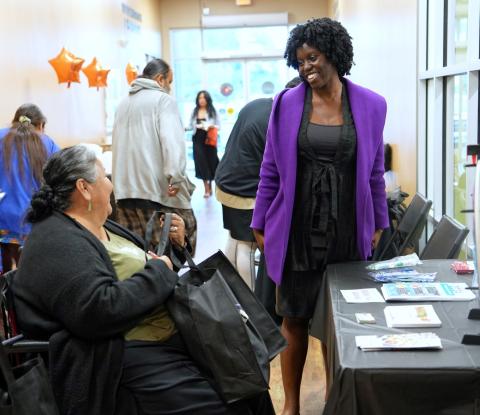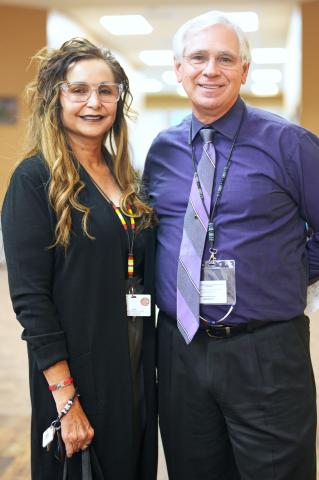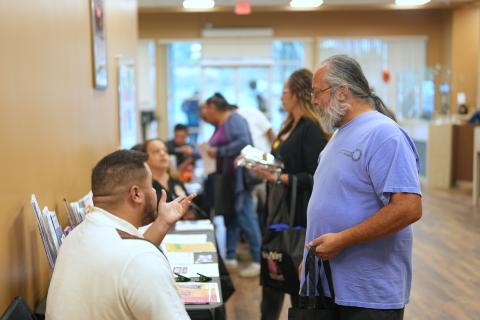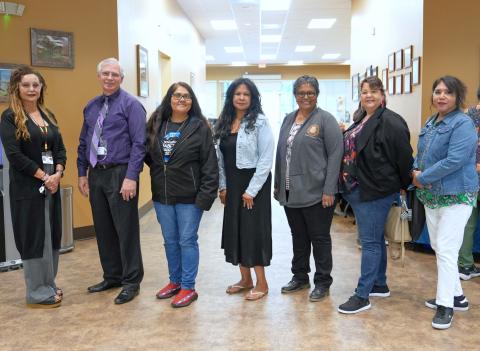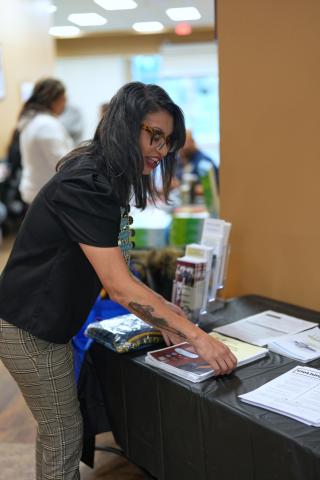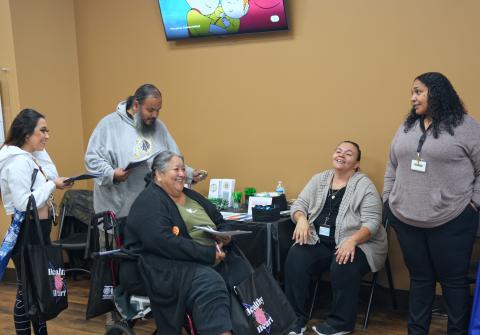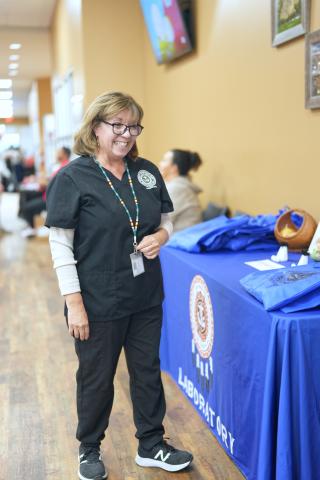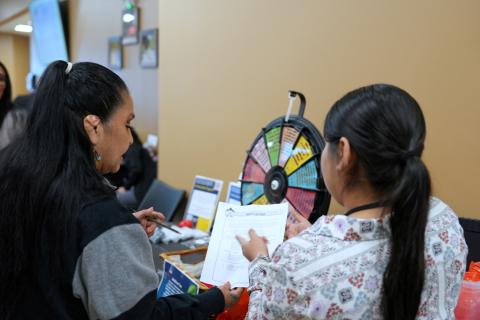Although Riverside-San Bernardino County Indian Health Inc. has been hosting Patient Appreciation Day events for more than a dozen years, Nov. 15 marked the first time one was held at the new Soboba Indian Health Clinic, which opened in March.
“This event is an opportunity for our patients and staff to meet each other and allow the patients to talk to the staff who work at that clinic in an informal manner outside the clinical exam room,” CEO Bill Thomsen explained. “It is an opportunity to talk about our services offered from that department, to go ‘behind the scenes’ in an area of the clinic the patient may not ordinarily visit and just take a walk through the clinic to see firsthand the building where we provide healthcare services for our patients.”
Every clinical department (medical, dental, lab, radiology, pharmacy, eye care, behavioral health, WIC and nutrition, Diabetes Program) was present. Also on hand were members of the clinic’s support services, such as the Human Resources Department, Patient Registration, Patient Services, Patient Advocate and its grant-funded programs, such as Native Challenge.
Each department had a table set up with informational handouts available to anyone who stopped by. These handouts are an introduction or an orientation to the department and the services they offer. The dental department offered a handout about proper brushing techniques and the importance of daily brushing and flossing. The medical department provided a handout on the importance of a well-child checkup for children. Each department had something specific to educate the patient to take charge of their health and learn a little bit more about self-care.
Behavioral Health Department representatives and Soboba Tribal members Kelli Hurtado and Damon Miranda offered information about nutrition, AA meetings, Talking Circles and more. Hurtado, a Community Prevention/Health Educator, said, “I talked about my Celebrating Families class and a lot of the patients did not know that we offered all these programs.” Miranda is a Peer Support Specialist who does Talking Circles in the community as well. The department offered promotional items and snacks to all visitors.
“Patient Appreciation Day is very important to let patients know that we care about them and also to update them on new details and classes the clinic offers,” Hurtado said. “I really love events like this because I’m able to connect with the community and see new faces and old faces; I love telling him about all the programs that we offer.”
Thomsen said the Soboba Tribal TANF program and the Veterans Administration were invited to host tables. “Per an agreement with the VA, we can provide healthcare services to Indian veterans in our clinic system and then bill the VA for such services so long as the veteran is registered with the VA,” Thomsen said.
The event also gave RSBCIHI representatives the opportunity to share some of the past and present developments happening within all eight sites/clinics that offer health services. Thomsen said that under the leadership of its board of directors, Riverside-San Bernardino County Indian Health Inc. began a large-scale capital projects plan in 2013 to replace its aging clinic buildings. It began with the purchase of a building in the city of Grand Terrace to relocate the San Manuel Clinic from a leased building in Highland.
“After about 18 months of construction, the new San Manuel Indian Health Clinic opened its doors to our Indian population,” he said. “Once this project was completed, our board of directors continued to move forward in purchasing a building in Barstow to replace an undersized leased office so more clinical services could be available to the Indian population in the Barstow and surrounding area. We then moved along to the Torres-Martinez clinic and replaced a triple-wide trailer with a brand new 11,605 sq.ft. clinic building. Next up was a new 11,605 sq.ft. Pechanga clinic to replace a small clinic which was housed jointly to the Pechanga Tribal Silver Feathers center. We then shifted gears to construct a first time ever clinic (3,500 sq.ft.) on the Santa Rosa reservation while also constructing a new clinic for the first time on the Cahuilla reservation.”
He said those two clinics replaced a leased office suite in the town of Anza which had been used as the local clinic in the mountains for more than 20 years. The next move was to Soboba. The current 38,000 sq.ft. clinic is double the size of the old clinic which was located about a half mile away in San Jacinto.
“We are now focusing on the Morongo Indian Health Clinic and working through the schematic stage of development and will begin construction on that new clinic later in 2024,” Thomsen said. “Except for the San Manuel and Barstow clinics, all new clinics are on our Indian reservations which we serve. The Tribes have been very generous partners in land allocation for these new clinics. Without their support and that of our board of directors, these capital projects may not have been possible or at least more difficult in land allocation off reservation.”
An important need is being met through RSBCIHI’s Diabetes Program, a federal grant-funded program through the Special Diabetes Program for Indians (SPDI) to increase the education, awareness and prevention of diabetes in Indian Country. This program hosts numerous community events to inspire patients to exercise, learn nutritional habits toward controlling diabetes and getting the whole family involved in healthcare.
Thomsen said, “For many years, RSBCIHI has organized a Native Youth Olympics game for our kids ages 4-18 to get them involved in different types of activities such as a 50-yard run, a basketball shootout, a softball toss, soccer shootout, and other events to educate everyone on the importance of some sort of activity. The COVID-19 pandemic put a hold on this event for a few years, but in 2024, our Diabetes Program will host this event again so we can get back on track with educating our youth on the importance of exercise to their health.”
RSBCIHI has several other grants with Riverside and San Bernardino counties that address mental health prevention education services. There are also several federal grants through its Native Challenge program to provide education to young parents on parenting skills and a Missing and Murdered Indigenous Persons crisis prevention program.
“Recently, RSBCIHI was awarded a five-year federal grant to partner with local 988 crisis centers to ensure there is a comprehensive and coordinated response to Tribal individuals at imminent risk for suicide,” Thomsen said. “We also have a U.S. Department of Justice, Office of Justice Programs, Office for Victims of Crime program to support existing services in a comprehensive and culturally salient manner to those individuals who identify as a victim of crime. There are so many things RSBCIHI does for our communities outside of medical and dental for the benefits of the Indian population we serve.”
Thomsen has worked with RSBCIHI since February 1996, beginning his career as a temporary Property & Supply Clerk. He then worked his way into the Quality Management Coordinator position and was COO for 12 years before assuming his position as CEO in April 2021.
“As CEO of RSBCIHI, it provides me with an opportunity to lead a team of Indian and non-Indian employees who all want to work toward achieving our mission statement each day. My position allows me to meet patients and listen to their concerns and improve our delivery system of care,” Thomsen said. “Our board of directors, who are elected from their respective Tribes, accept an obligation to provide the highest quality and most comprehensive healthcare services we can through our funding from Indian Health Services. There are challenges every day in meeting the needs of communities, but it is a challenge we accept every day when we come to work.”
The RSBCIHI Board of Directors is composed of designated tribal members from the nine consortium tribes. Each Tribal board member is selected by their general membership to serve a two-year term or as designated by the individual Tribe. Each Tribe has two primary and two alternate delegates. Soboba’s delegates are Camille Diaz and Julie Arrietta-Parcero; alternate delegates are Lisa Ortega and Monica Herrera.
“I feel these events are good for the patients because they are able to ask questions at each department,” Arrietta-Parcero said. “We also appreciate the employees that work for us.”
The board has a great responsibility to serve Riverside-San Bernardino County Indian Health Inc. as well as representing their Tribal healthcare interests for the betterment of the community. Their combined leadership brings expertise to many health-related topics affecting RSBCIHI. The board and its sub-committees meet regularly and are responsible for the oversight of the strategic and financial health of the organization.
For more information, www.rsbcihi.org.
Photos courtesy of StylePhotography by Alex Tapia


